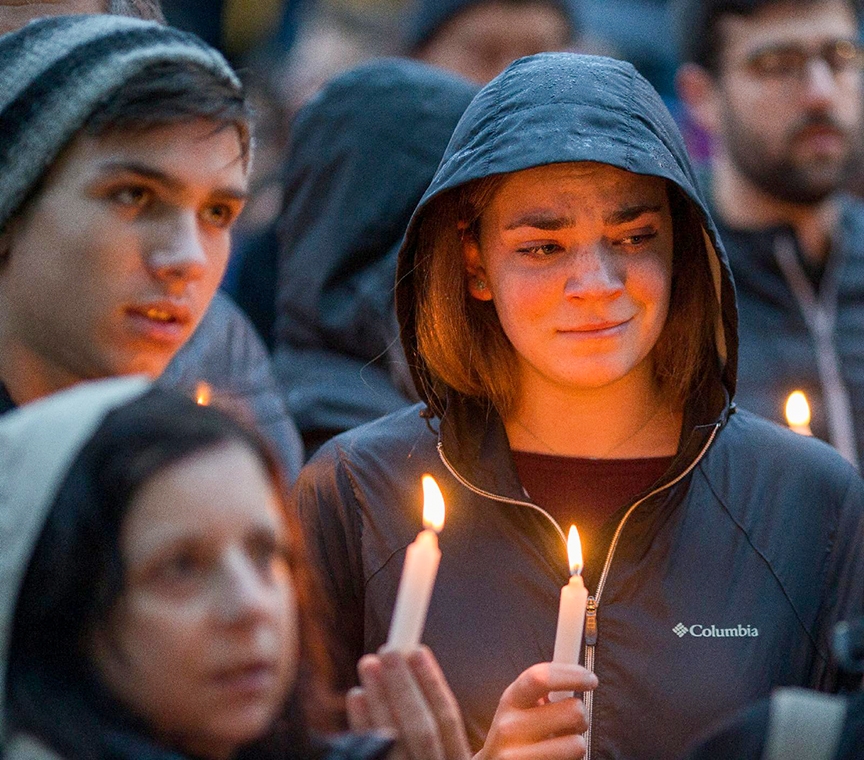
Experts in Jewish-Catholic relations are hailing a newly unveiled plan by the Biden administration to combat antisemitism, released amid a sharp rise in antisemitic incidents in recent years.
Announced May 25, the first-ever “U.S. National Strategy to Counter Antisemitism” highlights four key pillars for tackling the problem: increasing awareness of antisemitism while broadening appreciation for Jewish American heritage; improving safety and security for Jewish communities; reversing normalization of and countering antisemitism; and building cross-community solidarity and collective action against hatred.
“It is wonderful to see our country stepping forward to (address) this issue, as we’ve seen a worrying rise in antisemitism,” Rebecca Cohen, program and research specialist for the U.S. Conference of Catholic Bishops’ (USCCB) Secretariat for Ecumenical and Religious Affairs, told OSV News.
Included in the 60-page document are more than 100 new actions to which executive branch agencies have committed – among them, the 2024 launch of the first U.S.-based Holocaust education research center by the U.S. Holocaust Memorial Museum in Washington, a 2023 Antisemitism Awareness Campaign in schools and colleges by the Department of Education, and an annual threat assessment to be conducted by the Federal Bureau of Investigation (FBI) and the National Counterterrorism Center.
The Biden administration also said it was “(calling) on Congress to hold social media platforms accountable for spreading hate-fueled violence, including antisemitism,” while engaging community groups at all levels to collaborate in fighting antisemitism.
“The robust approach is wide-ranging and enlists diverse groups and constituencies,” said Adam Gregerman, professor of theology and co-director of the Institute for Jewish-Catholic Relations (IJCR) at St. Joseph’s University in Philadelphia. “Wisely, they call upon not only governmental bodies (both nationally and locally) but also non-governmental organizations, faith groups (Jewish and otherwise), educators, tech companies, and even museums to combat antisemitism. We know the need is great, with Jews disproportionately targeted in religiously motivated hate crimes.”
Citing FBI statistics, the Biden administration announcement said the U.S. has recently experienced “an alarming increase in antisemitic incidents,” with American Jews – who account for 2.4 percent of the population – representing 63 percent of the victims of reported religiously motivated hate crimes.
According to the Anti-Defamation League (ADL), the U.S. saw a 36 percent increase in antisemitic incidents from 2021 to 2022, the highest number on record since the organization began collecting data in 1979.
The new national strategy marks “an extremely important step on the part of the Biden-Harris administration, an acknowledgement that antisemitism has reached such a critical point in the U.S. that it requires concrete public policy action,” Arthur Urbano, professor of theology at Providence College in Providence, Rhode Island, told OSV News.
Urbano pointed to “a crisis of awareness” regarding antisemitism, “the history of Jew hatred and the horrors of the Holocaust.”
Catholics are not immune, he added.
“Unfortunately we see it also coming from public personas and events that claim to be promoting Catholic values, or even Catholic theology,” said Urbano.
The recent “Hope Is Fuel” online conference, coordinated by media personality and former Catholic Answers radio host Patrick Coffin, sparked controversy over its inclusion of speaker E. Michael Jones, author of “The Jewish Revolutionary Spirit: Its Impact on World History” and cited by the ADL for extensive antisemitic writings.
Jones told OSV News that he stood by his book’s premise that “when the Jews rejected Christ … they rejected the order of the universe.”
He also maintained that despite extensive teaching on Jewish-Catholic relations – which since the Second Vatican Council has clearly denounced antisemitism and affirmed God’s cherished relationship with Jews – that “the Church has never defined antisemitism.”
Cohen told OSV News that the USCCB is exploring the outline of such a definition, as part of a yearlong initiative on confronting antisemitism, and with an eye to the national strategy’s highlighting of the definition articulated by the International Holocaust Remembrance Alliance.
Even without referencing such definitions, “the Catholic Church today definitively teaches that antisemitism is inherently contrary to Christianity itself at an elemental level,” said Philip Cunningham, professor of theology at St. Joseph’s University and co-director of the IJCR.
“Any policy steps the government takes today to counteract bigotry and racism should be applauded by Catholics who themselves were victims of religious caricature and bigotry when they came in large numbers to these shores,” said Cunningham.
Cohen stressed the need for Catholics to “make sure they are aware of church teaching” on Jewish-Catholic relations, pointing to the resources available through the USCCB website and the Vatican’s Dicastery for Christian Unity, which includes key materials on religious relations with Jews.
“At the same time, I encourage Catholics to get out and be friendly with their Jewish neighbors,” she said. “Develop those friendships and relationships, and that trust.”









